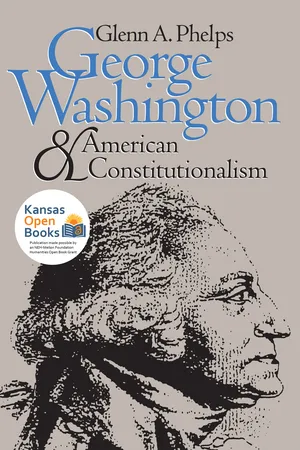
- English
- ePUB (mobile friendly)
- Available on iOS & Android
George Washington and American Constitutionalism
About this book
Known as the Father of His Country, George Washington is viewed as a demigod for what he was and did, not what he thought. In addition to being a popular icon for the forces of American nationalism, he served as commander-in-chief of the victorious Continental Army. That he played a key role in securing the adoption of the Constitution is well known, but few credit him with a political philosophy that actively shaped the constitutional tradition.
In this revisionist study, Glenn Phelps argues that Washington’s political thought influenced the principles informing the federal government then and now. Disinclined to enter the debates by which the framers hammered out a consensus, Washington instead sought to promote his way of thinking through private correspondence, and the example of his public life.
From these sources Phelps draws out his political ideas and demonstrates that Washington developed a coherent and consistent view of a republican government on a continental scale long before Madison, Hamilton, and other nationalists—a view grounded in classically conservative republicanism and continentally-minded commercialism. That he was only partially successful in building the constitutional system that he intended does not undercut his theoretical contribution. Even his failures affected the way our constitutional tradition developed.
Phelps examines Washington’s political ideas not as they were perceived by his contemporaries but in his own words, that is, he shows what Washington believed, not what others thought he believed. He shows how Washington’s political values remained consistent over time, regardless of who his counselors or “ghost writers” were. Using letters Washington wrote to friends and family—written free from the constraints of public politics—Phelps reveals “a man with a passionate commitment to a fully developed idea of a constitutional republic on a continental scale.”
In recent years scholarship about Washington has seemed to focus on mythmaking. For readers interested in the founding period, the framing of what Hamilton called the “frail fabric,” and constitutionalism, Phelps explores the substance behind the myth.
Open access edition funded by the National Endowment for Humanities and the Andrew W. Mellon Foundation Humanities Open Book Program.
Frequently asked questions
- Essential is ideal for learners and professionals who enjoy exploring a wide range of subjects. Access the Essential Library with 800,000+ trusted titles and best-sellers across business, personal growth, and the humanities. Includes unlimited reading time and Standard Read Aloud voice.
- Complete: Perfect for advanced learners and researchers needing full, unrestricted access. Unlock 1.4M+ books across hundreds of subjects, including academic and specialized titles. The Complete Plan also includes advanced features like Premium Read Aloud and Research Assistant.
Please note we cannot support devices running on iOS 13 and Android 7 or earlier. Learn more about using the app.
Information
Table of contents
- Front Cover
- Half Title
- Title Page
- Copyright Page
- Contents
- Preface: The Intentions of a Framer
- 1 The Conservative Revolutionary
- 2 The Republican General
- 3 The Restive Correspondent
- 4 The Framer as Partisan
- 5 The Framer as Interpreter
- 6 The Unintentions of a Framer
- Epilogue: George Washington and the Constitutional Tradition
- Notes
- Selected Bibliography
- Index
- Back Cover